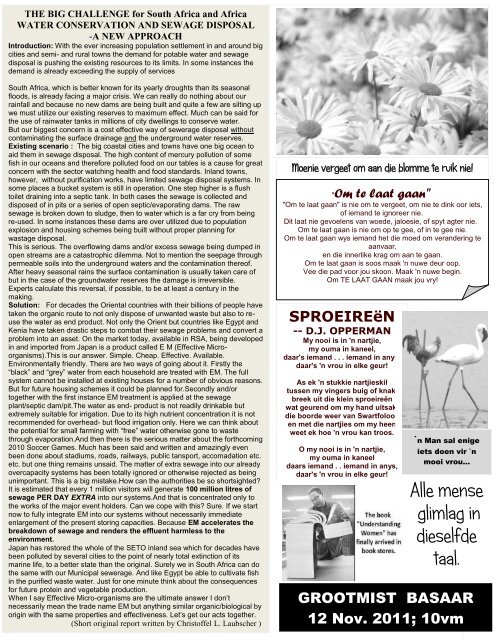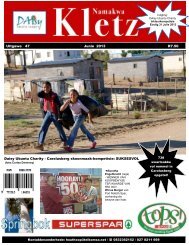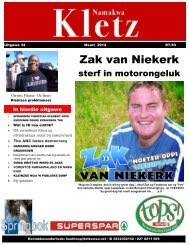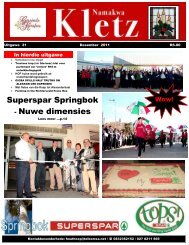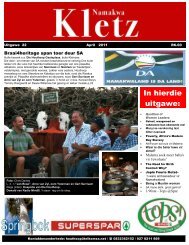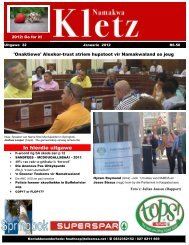Geestelike voedsel
Geestelike voedsel
Geestelike voedsel
You also want an ePaper? Increase the reach of your titles
YUMPU automatically turns print PDFs into web optimized ePapers that Google loves.
THE BIG CHALLENGE for South Africa and Africa<br />
WATER CONSERVATION AND SEWAGE DISPOSAL<br />
-A NEW APPROACH<br />
Introduction: With the ever increasing population settlement in and around big<br />
cities and semi- and rural towns the demand for potable water and sewage<br />
disposal is pushing the existing resources to its limits. In some instances the<br />
demand is already exceeding the supply of services<br />
South Africa, which is better known for its yearly droughts than its seasonal<br />
floods, is already facing a major crisis. We can really do nothing about our<br />
rainfall and because no new dams are being built and quite a few are silting up<br />
we must utilize our existing reserves to maximum effect. Much can be said for<br />
the use of rainwater tanks in millions of city dwellings to conserve water.<br />
But our biggest concern is a cost effective way of sewerage disposal without<br />
contaminating the surface drainage and the underground water reserves.<br />
Existing scenario : The big coastal cities and towns have one big ocean to<br />
aid them in sewage disposal. The high content of mercury pollution of some<br />
fish in our oceans and therefore polluted food on our tables is a cause for great<br />
concern with the sector watching health and food standards. Inland towns,<br />
however, without purification works, have limited sewage disposal systems. In<br />
some places a bucket system is still in operation. One step higher is a flush<br />
toilet draining into a septic tank. In both cases the sewage is collected and<br />
disposed of in pits or a series of open septic/evaporating dams. The raw<br />
sewage is broken down to sludge, then to water which is a far cry from being<br />
re-used. In some instances these dams are over utilized due to population<br />
explosion and housing schemes being built without proper planning for<br />
wastage disposal.<br />
This is serious. The overflowing dams and/or excess sewage being dumped in<br />
open streams are a catastrophic dilemma. Not to mention the seepage through<br />
permeable soils into the underground waters and the contamination thereof.<br />
After heavy seasonal rains the surface contamination is usually taken care of<br />
but in the case of the groundwater reserves the damage is irreversible.<br />
Experts calculate this reversal, if possible, to be at least a century in the<br />
making.<br />
Solution: For decades the Oriental countries with their billions of people have<br />
taken the organic route to not only dispose of unwanted waste but also to reuse<br />
the water as end product. Not only the Orient but countries like Egypt and<br />
Kenia have taken drastic steps to combat their sewage problems and convert a<br />
problem into an asset. On the market today, available in RSA, being developed<br />
in and imported from Japan is a product called E M (Effective Microorganisms).This<br />
is our answer. Simple. Cheap. Effective. Available.<br />
Environmentally friendly. There are two ways of going about it. Firstly the<br />
―black‖ and ―grey‖ water from each household are treated with EM. The full<br />
system cannot be installed at existing houses for a number of obvious reasons.<br />
But for future housing schemes it could be planned for.Secondly and/or<br />
together with the first instance EM treatment is applied at the sewage<br />
plant/septic dam/pit.The water as end- product is not readily drinkable but<br />
extremely suitable for irrigation. Due to its high nutrient concentration it is not<br />
recommended for overhead- but flood irrigation only. Here we can think about<br />
the potential for small farming with ―free‖ water otherwise gone to waste<br />
through evaporation.And then there is the serious matter about the forthcoming<br />
2010 Soccer Games. Much has been said and written and amazingly even<br />
been done about stadiums, roads, railways, public tansport, accomadation etc.<br />
etc. but one thing remains unsaid. The matter of extra sewage into our already<br />
overcapacity systems has been totally ignored or otherwise rejected as being<br />
unimportant. This is a big mistake.How can the authorities be so shortsighted?<br />
It is estimated that every 1 million visitors will generate 100 million litres of<br />
sewage PER DAY EXTRA into our systems.And that is concentrated only to<br />
the works of the major event holders. Can we cope with this? Sure. If we start<br />
now to fully integrate EM into our systems without necessarily immediate<br />
enlargement of the present storing capacities. Because EM accelerates the<br />
breakdown of sewage and renders the effluent harmless to the<br />
environment.<br />
Japan has restored the whole of the SETO inland sea which for decades have<br />
been polluted by several cities to the point of nearly total extinction of its<br />
marine life, to a better state than the original. Surely we in South Africa can do<br />
the same with our Municipal sewerage. And like Egypt be able to cultivate fish<br />
in the purified waste water. Just for one minute think about the consequences<br />
for future protein and vegetable production.<br />
When I say Effective Micro-organisms are the ultimate answer I don‘t<br />
necessarily mean the trade name EM but anything similar organic/biological by<br />
origin with the same properties and effectiveness. Let‘s get our acts together.<br />
(Short original report written by Christoffel L. Laubscher )<br />
10<br />
Moenie vergeet om aan die blomme te ruik nie!<br />
"Om te laat gaan"<br />
"Om te laat gaan" is nie om te vergeet, om nie te dink oor iets,<br />
of iemand te ignoreer nie.<br />
Dit laat nie gevoelens van woede, jaloesie, of spyt agter nie.<br />
Om te laat gaan is nie om op te gee, of in te gee nie.<br />
Om te laat gaan wys iemand het die moed om verandering te<br />
aanvaar,<br />
en die innerlike krag om aan te gaan.<br />
Om te laat gaan is soos maak 'n nuwe deur oop.<br />
Vee die pad voor jou skoon. Maak 'n nuwe begin.<br />
Om TE LAAT GAAN maak jou vry!<br />
SPROEIREëN<br />
-- D.J. OPPERMAN<br />
My nooi is in 'n nartjie,<br />
my ouma in kaneel,<br />
daar's iemand . . . iemand in anys,<br />
daar's 'n vrou in elke geur!<br />
As ek 'n stukkie nartjieskil<br />
tussen my vingers buig of knak,<br />
breek uit die klein sproeireën<br />
wat geurend om my hand uitsak,<br />
die boorde weer van Swartfoloos<br />
en met die nartjies om my heen<br />
weet ek hoe 'n vrou kan troos.<br />
O my nooi is in 'n nartjie,<br />
my ouma in kaneel<br />
daars iemand . . iemand in anys,<br />
daar's 'n vrou in elke geur!<br />
`n Man sal enige<br />
iets doen vir `n<br />
mooi vrou…<br />
Alle mense<br />
glimlag in<br />
dieselfde<br />
taal.<br />
10<br />
GROOTMIST BASAAR<br />
12 Nov. 2011; 10vm<br />
10<br />
10


